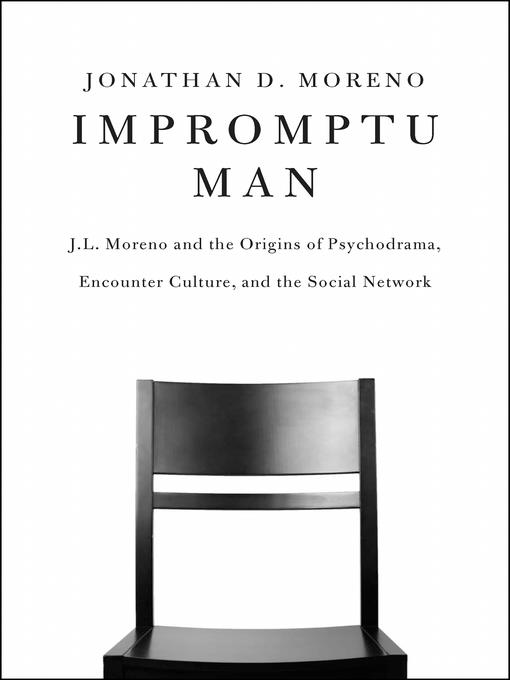
Impromptu Man
J.L. Moreno and the Origins of Psychodrama, Encounter Culture, and the Social Network
- اطلاعات
- نقد و بررسی
- دیدگاه کاربران
نقد و بررسی

July 28, 2014
Moreno (Mind Wars) seeks to elucidate his father’s intellectual contributions to ideas, movements, and practices of the 20th century and today; for, in the words of psychologist Karl Scheibe, “while influence has been mighty, his name has receded into the shadows.” Part biography and part cultural history, this well researched book begins with J.L. Moreno’s Viennese background and the beginnings of his important work, including the development of the concepts of “psychodrama,” the now-familiar combination of therapy and theater, and “sociometry,” the study of social relationships and a precursor to contemporary social-network analysis. Between the Encounter movement of the 1960s, military morale, humanistic psychology, Second City improv, and psychodrama training for trial lawyers, J.L.’s influence appears across domains and “it’s hard to exaggerate the extent to which pioneering ideas have penetrated the culture” since. The book’s first half is heavier on biography and feels dense despite conveying the eccentric and charming nature of its central subject. The narrative is at its best in the latter chapters, which survey the reach of his influence and provide a sort of sociometry of J.L.’s brilliant and creative ideas. 16 illus.

September 1, 2014
The son of the psychiatrist who founded psychodrama examines the life of his "famous, eccentric, and controversial" father and traces the evolution and impact of his ideas. For clarity, Moreno (Philosophy and Medical Ethics/Univ. of Pennsylvania; The Body Politic: The Battle Over Science in America, 2011, etc.) refers to his subject as J.L. throughout the book. Born in Bucharest in 1889, J.L. rejected Freudian theory while still a medical student. Early in his career, he developed a form of psychotherapy he called psychodrama, in which the stage becomes a therapeutic platform. From the 1940s to the 1970s, public psychodrama sessions were a feature of Manhattan's Moreno Institute. Recognized as one of the leading social scientists in the United States, J.L. believed that spontaneity and creativity are driving forces in human nature and that love and mutual sharing are powerful principles. In J.L.'s view, improvisation and spontaneity come together in psychodrama, providing a way for members to help each other. Moreno shows the influence of his father's ideas in the "happenings" of the 1960s and the group-dynamic experiments of the human potential movement. That J.L.'s ideas percolated through popular culture, though in watered-down form, is aptly demonstrated in the author's discussion of the hit movie Bob & Carol & Ted & Alice (1969), in which the characters experience an Esalen-like encounter, and of Clint Eastwood's 2012 empty-chair role-playing performance at the Republican convention, a technique rooted in improvisational theater that J.L. used in Vienna a century earlier. J.L.'s insights into group relationships-he created the science of sociometry-predates by decades the success of social networks such as Twitter and Facebook. The attention-loving J.L. understood the human impulse for self-expression and the desire to belong to a group. An adept introduction to an innovative thinker whose dramatic flair and sometimes-messianic personality tended to overshadow his accomplishments.
COPYRIGHT(2014) Kirkus Reviews, ALL RIGHTS RESERVED.

October 15, 2014
In this important biography of psychiatrist and group therapy pioneer J.L. Moreno (1889-1974), his son Jonathan D. Moreno (David and Lyn Silfen University Professor of Ethics, Univ. of Pennsylvania; The Body Politic: The Battle of Science in America) follows the elder Moreno from his Freudian roots in Vienna to the blossoming of the psychodrama movement in the United States, his home from 1925 until his death. The elder Moreno opened the Impromptu Theatre in Carnegie Hall in 1931; critics preferred defined drama to Moreno's spontaneous creativity, which later influenced Lee Strasburg and his style of "method acting." The author writes that his father "began to think that many human problems result from a deficit of spontaneity and creativity, an unfortunate and nearly universal consequence of growing up." Moreno met President Roosevelt, who implemented ideas of sociometric organization and fellow Europeans Kurt Lewin and Fritz Perls adopted his ideas of Training Groups and role playing. Along with Harvard University psychologist Henry Murray, Moreno trained spies in World War II and dealt with "battle fatigue," which is now referred to as post-traumatic stress disorder. Carl Rogers and Rollo May, influenced by Freudian apostate Otto Rank, were important postwar adepts. VERDICT A candid, engaging biography of an important pioneer in social psychology who should be better known.--E. James Lieberman, George Washington Univ. Sch. of Medicine, Washington, DC
Copyright 2014 Library Journal, LLC Used with permission.




دیدگاه کاربران